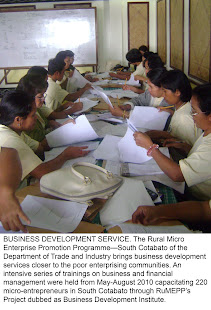At IFAD Governing Council, plenary panellists offer solutions and hear aspirations from young rural leaders and entrepreneurs
Rome, 19 February 2011 – Agricultural and rural development policies should do more to prioritize young people and their potential for energizing productivity and growth, stated participants in the plenary panel discussion held during the annual meeting of the International Fund for Agricultural Development (IFAD).The panel on “Feeding future generations: young rural people today – prosperous, productive farmers tomorrow” aired a range of views on why so many young women and men in developing countries leave their rural homes to make their lives in urban areas, and what can be done to build new opportunities for youth in farming and in the non-farm economy. The issue is at the top of the agenda for the 34th session of IFAD’s Governing Council, which is meeting at the Fund’s Rome headquarters through tomorrow.
The discussion explored the critical challenges rural youth face and how their energy can be tapped to help create more vibrant rural economies.
“The problem we see is that the first thing young people learn in rural areas is from the experience of their parents, which is that agriculture is very risky,” said Agnes Matilda Kalibata, Minister of Agriculture and Animal Resources of the Republic of Rwanda. “We need to give them a reason to be in agriculture.”
Bringing technology to rural areas would help, said Dayana Rivera Rivas of the Association of Small-scale Coffee Growers of La Marina (ASOPECAM). “But there are no clear policies for this. Young people are not going to stay in the field if they don’t have the necessary conditions, such as education, access to the media and Internet, and other instruments that will lead to a better future.”
Moderated by Tumi Makgabo, former CNN International presenter, the panel also explored critical linkages between youth-focused rural development strategies and addressing global food security challenges.
The event included numerous interventions by rural youth leaders and entrepreneurs from a variety of developing countries, which led to a lively exchange of experiences and viewpoints.
Carlo Petrini, President of the International Slow Food Movement, laid blame on modern agricultural economics and policies, which he says prioritizes commodities over the people who actually grow food. “Agriculture cannot be considered to be like other sectors, because farmers do much more than growing. They defend the landscape, they protect the environment – and who pays them for this?” he asked.
“Young people must be enabled to remain and work in rural areas,” he said. “They need to have a health system, education and technologies – they need to want to remain. We need to empower not commodities but communities.’’
Petrini’s comments were echoed by one of the youth leaders participating in the event. Arindam Das Gupta, an activist for rural youth in India, said “we need to build the image of agriculture, and the importance of what farmers are doing in our societal structure”.
With more than 1 billion people in the world today between 15 and 24 years of age, and people under 25 accounting for up to 60 per cent of the population in some African countries, the panel delved into why rural areas are not benefiting from this huge resource and why so many young women and men are leaving rural areas to seek opportunities elsewhere.
”We cannot afford to under-utilize the most important resource we have – the human resource – and particularly the solutions that they can contribute,” said Simona Marinescu, Senior Economist at the United Nations Development Programme, former Minister of Labour and former Senator of Romania. “No other group in our society has their power and passion, and they ought to be involved in the social dialogue in our countries.”
IFAD’s annual meeting opened this morning with keynote addresses from Kofi Annan, Chairman of the Board of the Alliance for a Green Revolution in Africa (AGRA), and Princess Haya Al Hussein, United Nations Messenger of Peace and wife of the Vice-President and Prime Minister of the United Arab Emirates.
The meeting continues tomorrow, 20 February, with an agenda that includes four regionally-focused panel discussions exploring the challenges faced by rural young people and featuring agricultural and rural development experts, young entrepreneurs from rural areas and leaders of youth-based organizations.
For more information on IFAD’s annual meeting and a detailed programme, please visit: www.ifad.org.
For images of IFAD’s work please visit the IFAD image bank.
The IFAD social reporting team will report live from the Governing Council. Follow them on Twitter and Facebook.
Press release No.: IFAD/12/2011
The International Fund for Agricultural Development (IFAD) works with poor rural people to enable them to grow and sell more food, increase their incomes and determine the direction of their own lives. Since 1978, IFAD has invested over US$12.5 billion in grants and low-interest loans to developing countries, empowering more than 370 million people to break out of poverty. IFAD is an international financial institution and a specialized UN agency based in Rome – the UN’s food and agricultural hub. It is a unique partnership of 167 members from the Organization of the Petroleum Exporting Countries (OPEC), other developing countries and the Organisation for Economic Co-operation and Development (OECD).
www.ifad.org

